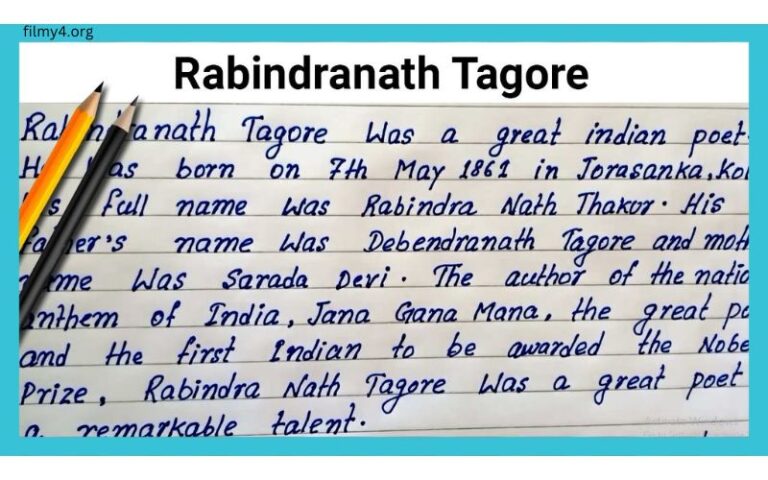Rabindranath Tagore, the multifaceted luminary of Bengal, is not merely a name but an emblem of artistic brilliance, philosophical depth, and social reform. His contributions span literature, music, art, education, and activism, leaving an indelible mark on the cultural landscape of not just India, but the world. In this comprehensive biography, we delve into the life, works, and enduring legacy of Tagore, illuminating the essence of his unparalleled genius.
Early Life and Education
Rabindranath Tagore was born on May 7, 1861, in Calcutta (now Kolkata), into a prominent Bengali family. His father, Debendranath Tagore, was a revered philosopher and leader of the Brahmo Samaj, a socio-religious reform movement. Growing up in an intellectually stimulating environment, young Rabindranath imbibed the spirit of creativity and social consciousness from his family.
Tagore’s formal education began at home, where he was tutored in various subjects, including Bengali, Sanskrit, English, Mathematics, and History. His unconventional education, which emphasized experiential learning and a deep engagement with nature, laid the foundation for his holistic worldview and creative pursuits.
Literary Journey
At the age of sixteen, Tagore published his first collection of poems, titled “Kabi Kahini” (The Poet’s Tale), marking the beginning of his illustrious literary career. His early works were deeply influenced by the Vaishnava bhakti tradition and the natural beauty of rural Bengal. However, it was his seminal work, “Gitanjali” (Song Offerings), published in 1910, that catapulted him to international acclaim.
“Gitanjali,” a collection of devotional poems translated into English, earned Tagore the Nobel Prize in Literature in 1913, making him the first non-European to receive this honor. The lyrical beauty and spiritual depth of his poetry resonated with readers worldwide, transcending cultural and linguistic barriers.
Apart from poetry, Tagore was a prolific playwright, novelist, essayist, and short story writer. His literary oeuvre encompasses a wide range of themes, including love, nature, patriotism, humanism, and spirituality. Works such as “Chokher Bali,” “Gora,” and “The Home and the World” showcase his keen insight into the complexities of human relationships and societal dynamics.
Philosophical Vision
Central to Tagore’s philosophy was the concept of “Visva-Bharati,” or the communion of the world through education. In 1901, he founded an experimental school in rural Bengal, which later evolved into Visva-Bharati University. Rejecting the traditional rote-based education system, Tagore emphasized the importance of creativity, critical thinking, and moral development in education.
Visva-Bharati became a melting pot of cultures, attracting students and scholars from across the globe. Tagore envisioned it as a center for holistic learning, where the arts, sciences, and humanities converge to foster a harmonious blend of intellect and spirituality. His educational ideals continue to inspire educational reforms and innovations worldwide.
Social and Political Activism
Tagore’s literary genius was intertwined with his deep commitment to social justice and political freedom. He was a staunch critic of colonialism, imperialism, and religious bigotry, advocating for universal human values and communal harmony. Tagore’s anti-nationalist stance during the Indian independence movement, epitomized by his renunciation of knighthood in protest against the Jallianwala Bagh massacre, earned him both admiration and criticism.
Despite facing backlash from nationalist quarters, Tagore remained steadfast in his belief in the power of dialogue, empathy, and cultural exchange as antidotes to the divisiveness of identity-based politics. His internationalist outlook and advocacy for intercultural understanding foreshadowed the ideals of globalization and multiculturalism in the twenty-first century.
Legacy and Influence
Rabindranath Tagore’s legacy transcends geographical boundaries and temporal constraints, continuing to inspire generations of artists, intellectuals, and activists worldwide. His literary works, musical compositions, and artistic endeavors have left an indelible imprint on the cultural fabric of humanity, earning him the epithet of “Gurudev” (the divine teacher).
Tagore’s contributions to literature were not confined to his native Bengali language but extended to the global literary canon through translations and adaptations. His ideas on education, environmental conservation, and intercultural dialogue remain relevant in the contemporary world, offering timeless wisdom and guidance in navigating the complexities of modernity.
Conclusion
In the annals of literary history, few figures loom as large as Rabindranath Tagore, whose life and works exemplify the transformative power of art, education, and humanistic values. As we reflect on his extraordinary journey from the idyllic landscapes of Bengal to the global stage of ideas, we are reminded of the enduring relevance of his vision for a more inclusive, compassionate, and harmonious world. In celebrating Tagore’s legacy, we not only honor the man but also embrace the timeless ideals that continue to illuminate our path towards a brighter future.
